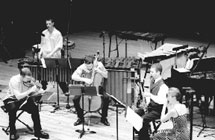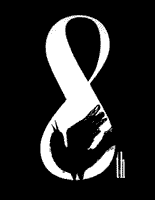

How is it that the CBS Morning Show decided to venture to Oberlin and tape yesterday's Eighth Blackbird concert at Finney Chapel? In most professions, particularly music performance, there are a certain number of quests one must fulfill before a person can be considered to have really made it.

With considerable talent, ingenuity, luck, or a combination of the three, a person or group can circumvent some of those hurdles early on, gaining a huge advantage in a competitive field. The chamber group Eighth Blackbird, which formed in the depths of the Oberlin Conservatory, is winning out over the corporate system as we speak, paving the way for their musical future in gold, with media giants like CBS lapping at their heels.
Eighth Blackbird is an instrumental ensemble composed of flutist Molly Barth, clarinetist Michael Maccaferri, violinist Matthew Albert, pianist Lisa Kaplan, cellist Nicholas Photinos, and percussionist Matthew Duvall. All these musicians were top musicians in the Conservatory of Music before their graduations. Most have played major works in a solo setting with Oberlin students; many won Oberlin's Concerto Competition. Their reputation as a group now supersedes their reputations as individual virtuosos. Under the coaching of Contemporary Music Ensemble director Tim Weiss, these six students found they share an affinity and a talent for contemporary music. Since their formation, they have won every major American competition for chamber music, including top prizes at the forbidding Fischoff and Coleman competitions.
Last year, they brought home some prizes from the Concert Artists Guild Competition. 80-100 semifinalists compete for varying prizes, which include a recording contract, representation by the Concert Artists Guild, and a concert tour, as well as special appearances or a New York debut. Not only did they take top prize there, but they won the Chanel Classics Recording Prize and the Rockport Chamber Music Festival Prize, and are now represented by the Concert Artists Guild. The players now study in Cincinnati.

It turns out that the hostess of a portion of the show, Eugenia Zukermann, was visiting her daughter, an Oberlin student, last year. They caught the Art Afterhours show which Eighth Blackbird played at the Art Museum. Mike Maccaferri stated that they just kept in contact after that and sent their promotional stuff to CBS. The rest is history. Molly Barth stated yesterday that "CBS is keeping us very busy." They spent several hours before the concert working with the CBS crew.
The instrumentation of this ensemble is definitely not standard; string quartets or woodwind quintets usually claim the likes of fine chamber players such as these. However, it is not as odd as it might seem; this instrumentation of 2 woodwinds, 2 strings, piano, and percussion has been increasingly composed for in the 20th century. The landmark work by Schoenberg, Pierrot Lunaire, is written for just such an arrangement. New music is central to their repertoire.
The Thursday night concert played to a well-populated Finney Chapel. The ensemble eschewed the obligatory black garb for more eclectic, individualized outfits in black-and-white (except Albert, in a florescent green shirt.) A Joan Tower work, Petrouchskates (1980), opened. Tower composed this in homage to the composer Stravinsky, but also as a musical analogy to figure skating. She calls it "a musical carnival on ice." The work highlights other Stravinsky traits, such as frequent shifts of meter, driving unpredictable rhythms, and his notable harmonies. The work is very difficult to put together, as the players must execute difficult rhythms independently. Energy radiated from the ensemble during this work.
The second work, Thomas Albertís Thirteen Ways of Looking at a Blackbird, is our first introduction to the Wallace Stevens poem from which Eighth Blackbird takes its name. The violinists' father is the composer and was in attendance. Matt Albert stated during the concert that he found it difficult to play the work his father had written; it was an honor, but he "wants it to be so perfect."
The ensemble members would recite a verse of the poem and then depict it according to the composer's vision of that verse. The piece showed Mr. Albert's versatility in mood and technique, and contained several subtle quotes or imitations. For example, the eleventh verse, which speaks of a glass coach, was written in the style of composer Philip Glass. Many in the audience caught Albert's quote of the Beatles song "Blackbird" in the eighth verse in the piccolo part. Mr. Albert stated that he in fact wrote this piece for the ensemble and that this was their third performance of it. The crowd had a winning reaction to this piece and inundated the composer with compliments.
Lukas Foss' version of the poem is composed for flute, voice, percussion, and piano, and seemed more academic. It involves prepared piano techniques (dropping bowls on the open strings of the piano, for those who were wondering), flute techniques of harmonics, flutter-tonguing, and key-slapping which by now are almost standard, and some tape delay effects which rather startled the audience. Vocalist Oberlin alum Antoinette Arnold, found out about Eighth Blackbird through the Conservatory news and contacted them. She fit into the sound of the group quite well, and demonstrated good capability at voice techniques such as sprechstimme and stage whispers.
The final work was Lang's "Cheating, Lying, Stealing." The composer intended this to show the dark side of himself, and indicates on the score that it is an "ominous funk." It was hard for this capable group to sound so untrustworthy, but they managed. Barth and Albert showed their versatility by playing antiphonal percussion. Photinos' cello solo was dynamite, as was the entire group. Their clean, balanced playing thrilled everyone.
One would have thought the name Eighth Blackbird would have come from one of the above pieces of music on the poem by Wallace Stevens. Actually, it was the other way around. They were already aware of the poem and had decided on their name when, as Barth said, "we found out afterwards that [the poem] was one of the most often set to music." The eighth way of looking at a blackbird, incidentally, is "that I know noble accents/And lucid inescapable rhythms/But I know, too, /That the blackbird is involved in what I know."
Singing in the dead of night: Eighth Blackbird members returned to Oberlin for yet another stellar evening of mdoern instrumental music in what is now their professional career. (photo by Heidi Good)
Copyright © 1998, The Oberlin Review.
Volume 126, Number 22, April 24, 1998
Contact us with your comments and suggestions.